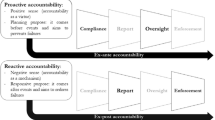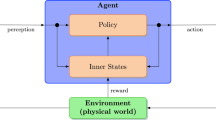Abstract
Argumentation schemes are patterns of non-deductive reasoning that have been the focus of extended study in argumentation theory. They have also been identified in computational domains including multi-agent systems as holding the potential for significant improvements in reasoning and communication abilities. By focusing on models of natural language argumentation schemes, and then building formal systems from them, direct implementation in multi-agent environments becomes a possibility. The formal, representational and implementational details are presented here, along with results that demonstrate not only advantages of flexibility, scope, and knowledge sharing, but also of computational efficiency.
Similar content being viewed by others
References
L. Amgoud C. Cayrol (2002) ArticleTitle“A model of reasoning based on the production of acceptable arguments.” Ann.Math Artif. Intell. 34 197–216 Occurrence Handle10.1023/A:1014490210693
K. Atkinson, T. Bench-Capon, and P. McBurney, “Justifying practical reasoning” in F. Grasso, C. Reed, and G. Carenini, (eds.), Working Notes of the 4th Workshop on Computational Models of Natural Argument (CMNA 2004), Valencia, 2004.
T. Bench-Capon (2003) ArticleTitle“Try to see it my way: modelling persuasion in legal discourse” Artif. Intell. Law 11 IssueID4 271–287 Occurrence Handle10.1023/B:ARTI.0000045997.45038.8f
F. Bex H. Prakken C. Reed D. Walton (2003) ArticleTitle“Towards a formal account of reasoning about evidence: argument schemes and generalisations” Artif. Intell. Law 11 IssueID2–3 125–165 Occurrence Handle10.1023/B:ARTI.0000046007.11806.9a
P. M. Dung (1995) ArticleTitle“On the acceptability of arguments and its fundamental role in nonmonotonic reasoning, logic programming and n-person games” Artif. Intell. 77 205–219 Occurrence Handle10.1016/0004-3702(94)00041-X
F. H. Eemeren Particlevan R. Grootendorst (1992) Argumentation, Communication and Fallacies Lawrence Erlbaum Associates Mahwah, New Jersey
J. B. Freeman (1991) Dialectics and the Macrostructure of Argument Amserdam Foris
M. A. Gilbert (1997) Coalescent Argumentation Lawrence Erlbaum Associates Mahwah, New Jersey
W. Grennan (1997) Informal Logic McGill-Queens University Press Montreal
A. C. Hastings, A Reformulation of the Modes of Reasoning in Argumentation, Evanston, Illinois, Ph.D. Dissertation, 1963.
J. Katzav C. A. Reed (2004) ArticleTitle“On argumentation schemes and the natural classification of argument” Argumentation 18 IssueID2 239–259 Occurrence Handle10.1023/B:ARGU.0000024044.34360.82
M. Kienpointner, “Towards a typology of argument schemes” in Proceedings of the International Conference of the Society for the Study of Argument (ISSA 1986), Amsterdam University Press: Amsterdam, 1986.
M. Kienpointner, Alltagslogik: Struktur und Funktion von Argumentationsmustern, Stuttgart, Fromman-Holzboog, 1992.
P. A. Kirschner S. J. Buckingham Shum C. S. Carr (2003) Visualizing Argument Springer Berlin
P. McBurney S. Parsons (2002) ArticleTitle“Games that Agents Play” Journal of Logic, Language and Information. 11 IssueID3 315–334
T. J. Norman, D.V. Carbogim, E. C. Krabbe, and D. Walton, (2003) “Argument and Multi-Agent Systems”, in (Reed and Norman), pp. 15–54, 2003.
S. Parsons and N. R. Jennings, “Negotiation through argumentation: A Preliminary Report”, in Proceedings of the 2nd International Conference on Multi Agent Systems (ICMAS 96),AAAI Press, pp. 267–274, 1996.
C. Perelman and L. Olbrechts-Tyteca, The New Rhetoric: A Treatise on Argumentation,University of Notre Dame Press, 1969.
J. L. Pollock, Cognitive Carpentry: A Blueprint for How to Build a Person, MIT Press, 1995.
H. Prakken, C. A. Reed, and D. Walton, “Argumentation Schemes and Generalisations in Reasoning about Evidence” in Proceedings of the 9th International Conference on AI & Law, ACM Press, pp. 32–41, 2003.
H. Prakken and G. Vreeswijk, “Logics for defeasible argumentation”, in D. Gabbay, and F. Guenther, (eds.), Handbook of Philosophical Logic, Vol. 4, Kluwer, pp. 218–319, 2002.
Quintilian Institutio Oratoria, Harvard University Press, Translated H.E. Butler, 1920.
C. A. Reed T. J. Norman (2003) Argumentation Machines Kluwer Dordrecht
C. A. Reed and G. W. A. Rowe, “Araucaria: Software for Puzzles in Argument Diagramming and XML”, Department of Applied Computing, University of Dundee Technical Report available at http://www.computing.dundee.ac.uk/staff/creed/, 2001.
C. A. Reed G. W. A. Rowe (2004) ArticleTitle“Araucaria: Software for Argument Analysis, Diagramming and Representation” International Journal of AI Tools 14 IssueID3–4 961–980 Occurrence Handle10.1142/S0218213004001922
S. E. Toulmin (1958) The Uses of Argument Cambridge University Press Cambridge
Verheij B. “Dialectical argumentation with argumentation schemes: towards a methodology for the investigation of argumentation schemes”, Proceedings of the Fifth Conference of the International Society for the Study of Argumentation (ISSA 2002), Sic Sat, Amsterdam, pp. 1033–1037, 2003.
T. van Gelder and A. Rizzo, “Reason!Able across the curriculum”, in Is IT an Odyssey in Learning? Proceedings of the 2001 Conference of the Computing in Education Group of Victoria, 2001.
D. Walton (1996) Argumentation Schemes for Presumptive Reasoning Lawrence Erlbaum Associates Mahwah, New Jersey
D. Walton and C. A. Reed, “Argumentation schemes and enthymemes”, Synthese,2005, to appear.
Author information
Authors and Affiliations
Corresponding author
Rights and permissions
About this article
Cite this article
Reed, C., Walton, D. Towards a Formal and Implemented Model of Argumentation Schemes in Agent Communication. Auton Agent Multi-Agent Syst 11, 173–188 (2005). https://doi.org/10.1007/s10458-005-1729-x
Issue Date:
DOI: https://doi.org/10.1007/s10458-005-1729-x




